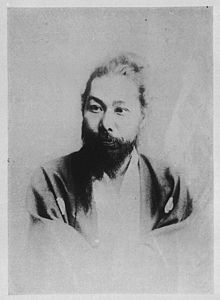Tōten Miyazaki
You can help expand this article with text translated from the corresponding article in Japanese. (November 2018) Click [show] for important translation instructions.
|
Tōten Miyazaki | |
|---|---|
| 宮崎 滔天 | |
 | |
| Born | 23 January 1871 |
| Died | 6 December 1922 (aged 51) |
| Occupation | Philosopher |
| Children | Ryūsuke Miyazaki |
Tōten Miyazaki (Japanese: 宮崎 滔天, Hepburn: Miyazaki Tōten) or Torazō Miyazaki (1 January 1871 – 6 December 1922) was a Japanese philosopher who aided and supported Sun Yat-sen during the Xinhai Revolution. While Sun was in Japan, he assisted Sun in his travels as he was wanted by Qing dynasty authorities.[1]
Biography
[edit]Tōten Miyazaki registered Sun for his safety under the name Nakayama (中山) at the "Crane Hotel" (對鶴館). This name would later be converted to the more popular Chinese name Sun Zhongshan (孫中山).[1] On 7 September 1900, Sun's first overseas visit to Singapore was to rescue Miyazaki Toten who was arrested there. This act resulted in his own arrest and a ban from visiting the island for five years.[citation needed]
The Nanjing Historical Remains Museum of Chinese Modern History has bronze statues of Sun and Miyazaki placed alongside each other.[citation needed]
In 1902 Miyazaki became a naniwa-bushi (Rōkyoku) balladeer and apprenticed to Tōchūken Kumoemon. He attempted to articulate his philosophy to ordinary Japanese people through the art form.[2]
Bibliography
[edit]See also
[edit]References
[edit]- ^ a b Sing Tao Daily. Saturday edition. 23 Oct 2010. 特別策劃 section A18. Sun Yat-sen Xinhai revolution 100th anniversary edition 民國之父.
- ^ Littler, Joel (4 January 2024). "A Song of Fallen Flowers : Miyazaki Tōten and the making of naniwabushi as a mode of popular dissent in transwar Japan, 1902–1909". Modern Asian Studies: 1–24. doi:10.1017/S0026749X23000392. ISSN 0026-749X.
External links
[edit] Media related to Tōten Miyazaki at Wikimedia Commons
Media related to Tōten Miyazaki at Wikimedia Commons
